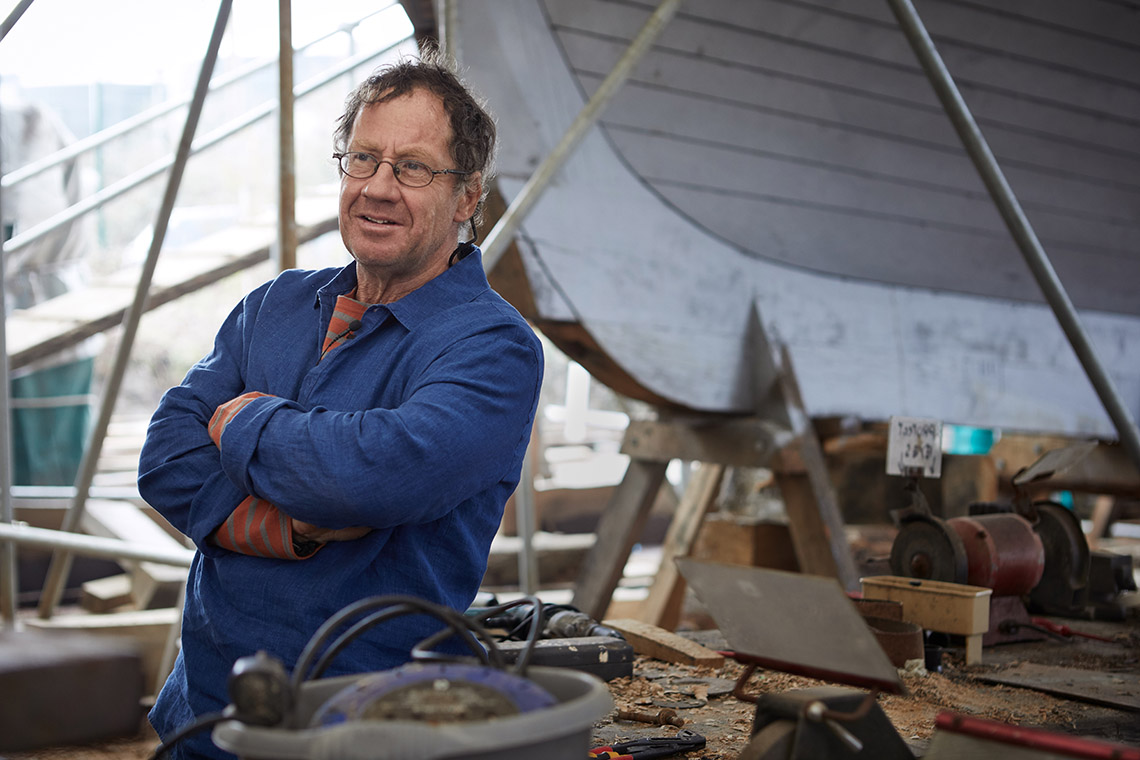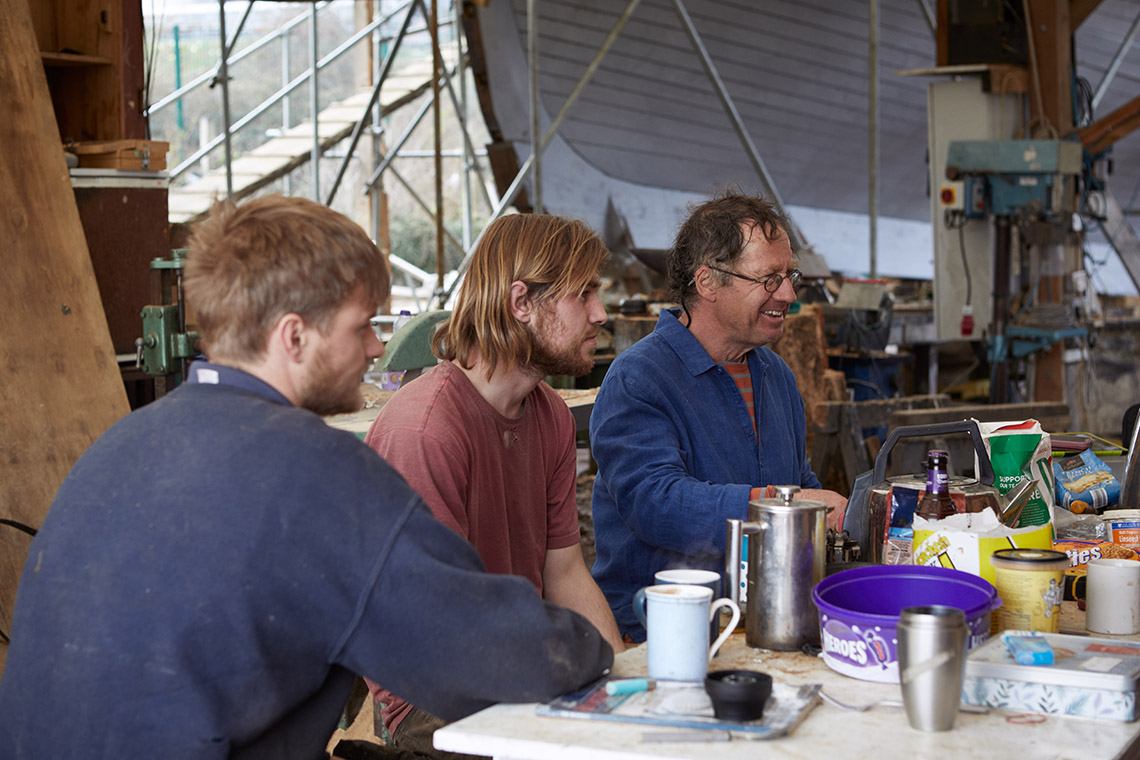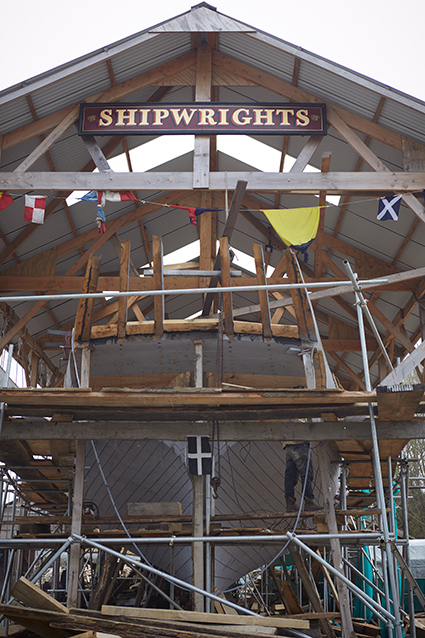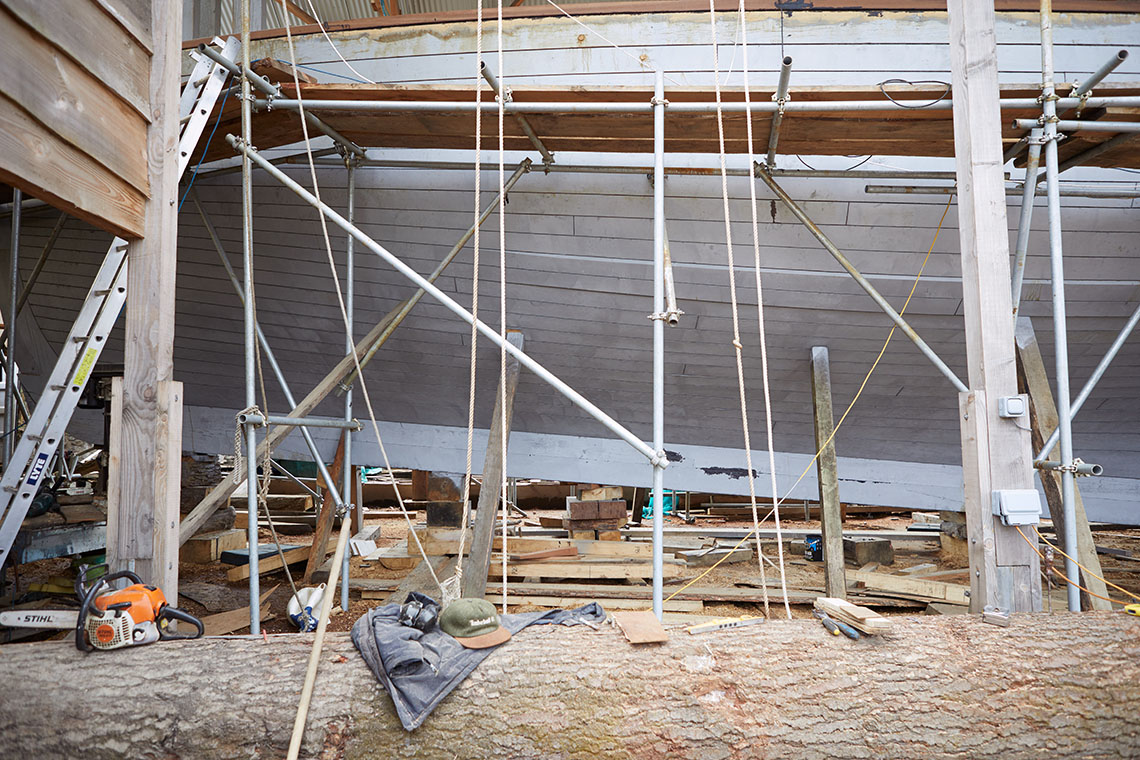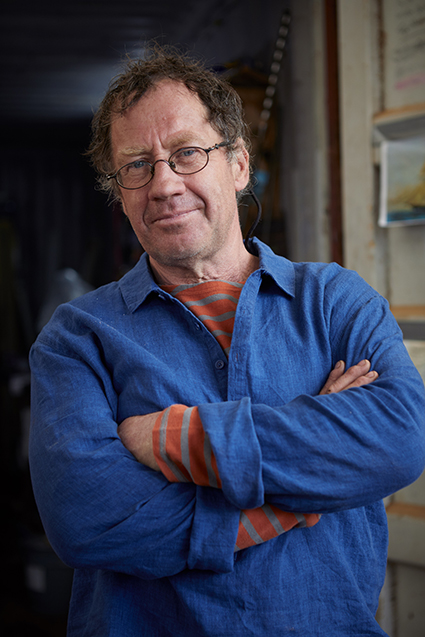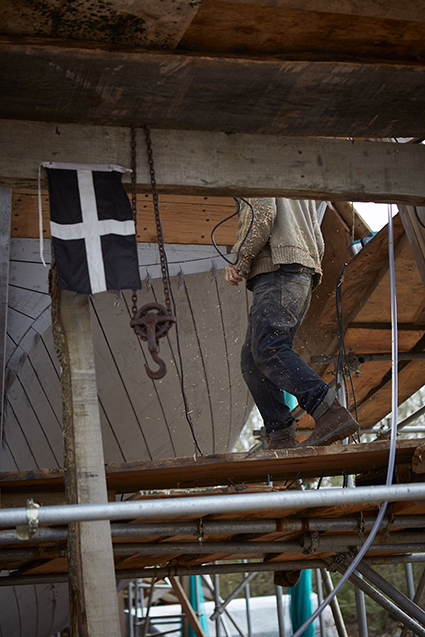Introducing Luke Powell, boatbuilder
Shining a light on Cornwall’s pioneers, Seasalt celebrates flourishing local talent. Each month, in support of their passion, we share their inspiring stories.
This month, we met boatbuilder, Luke Powell at his yard near Truro. Luke is dedicated to keeping the art and craftmanship of traditional wooden boats alive and runs a pioneering project training young people in the art of boatbuilding.
What drew you to boatbuilding – how did you get started?
I grew up around boats and lived afloat from age of 9 through to about 35. As life went on, I realised the wooden boats were disappearing, and I felt somebody needed to get started building new boats before there were none left. I’ve always had a love for the shape of wooden boats and a love for making things, so I supposed I felt I was as good as anyone.
Tell us about the project you’re working on
The boat we’re currently working on is an authentic copy of a pilot cutter from the area, a vessel called the Vincent. She was built in 1852 and finished working in the 1920s, so she had a long life. There are many old photographs of her, so when we were trying to choose a boat to build a copy of, she was a good candidate. She was quite famous, and a very good sailing boat in her time.
We’re going to call her the Pellew, after Edward Pellew (a famous sea captain in the Napoleonic Wars). What’s exciting is she’ll be the biggest boat of this type in the country. People have forgotten how to sail these boats – she’s a cutter rig and the main boom is 45ft long – so it’s going to be quite a wild boat to sail.
The whole project is about keeping the old skills alive. It’s not just about building the boat, it’s about training young people in the art of boat building and developing their skills so they can take over from people like me. We need young people coming through to keep boatbuilding alive. It’s an endangered craft, and without support it would disappear.
This yard wants to become a place of refuge for wooden boats, and a place where we can nurture the skills of young people. We’re going to develop start-up units for young people where they can work on their own projects, supported by us. Our plan is to create a facility that will draw boats and people in, we’re going to have blacksmiths and sailmakers. It will become an oasis for those that believe in the wooden boat.
What drew you to the Falmouth area, and what’s the best thing about living and working here?
The climate’s very good, I know it rains a lot in Cornwall, but it’s warmer than the rest of the country – and we work outdoors. I used to work on the east coast and it bitterly cold there in the winter. The sailing in Cornwall is fabulous; the coast is beyond belief and so if you’re going to be involved with boats in England, Cornwall is about the best place. Sailing around the coast is incredible – it could be the Mediterranean at times or Greece. And there’s the maritime history in Cornwall that appeals to me. I’m fascinated by all the smuggling and piracy that went on.
Agnes has her own story – can you tell us a little about her?
I started building boats in Cornwall nearly 20 years ago, and I wanted to build an authentic copy of an original boat. Agnes was the first replica we built, an Isles of Scilly pilot cutter. We built her in 2003 and she proved to be a fabulous vessel. That type of boat hadn’t been in living memory, so there were various aspects of her we had to discover.
She sailed very well and we sold her to an American who took her to the US. His business didn’t work out, so I ended up buying Agnes back, which was fortunate for me, because she was the vessel I felt most connected with. We now run her as a charter boat, sailing up and down the coast and showing people the beauty of Cornwall.
You combine boatbuilding with running sailing adventure holidays from Falmouth – how do you balance the two aspects of the business?
We were solely building boats to begin with and we built seven or eight boats. Then the banking crash happened, so there was suddenly a lack of commissions. At that point we had to diversify, and it seemed sensible to run Agnes doing charter work. It kept us within our world and showed our world to a wider audience. So we’ve been doing that for the last six or seven years. Then a friend of mine suggested the project to train young people how to build traditional wooden boats. We’re now juggling the charter work with Agnes and running the yard. As it grows, it will take up more of my time, so my wife, Joanna is running Agnes. I step in for a voyage here and there, and it’s nice to be back on board, but I think my heart’s here now, with the new boat.
Life on board Agnes is about getting away from the modern world. It’s extraordinary how everybody’s tied to computer screens, smartphones and electronic devices. We sail off and find ourselves in a bay with no signal and oil lamps, and everybody sits around the table and we have a few bottles of wine. It’s interesting how people discover the art of conversation again and the joy of sailing a boat that speaks of another age. There’s something quite profound about being on something that’s not of our time: there’s a romance to it.
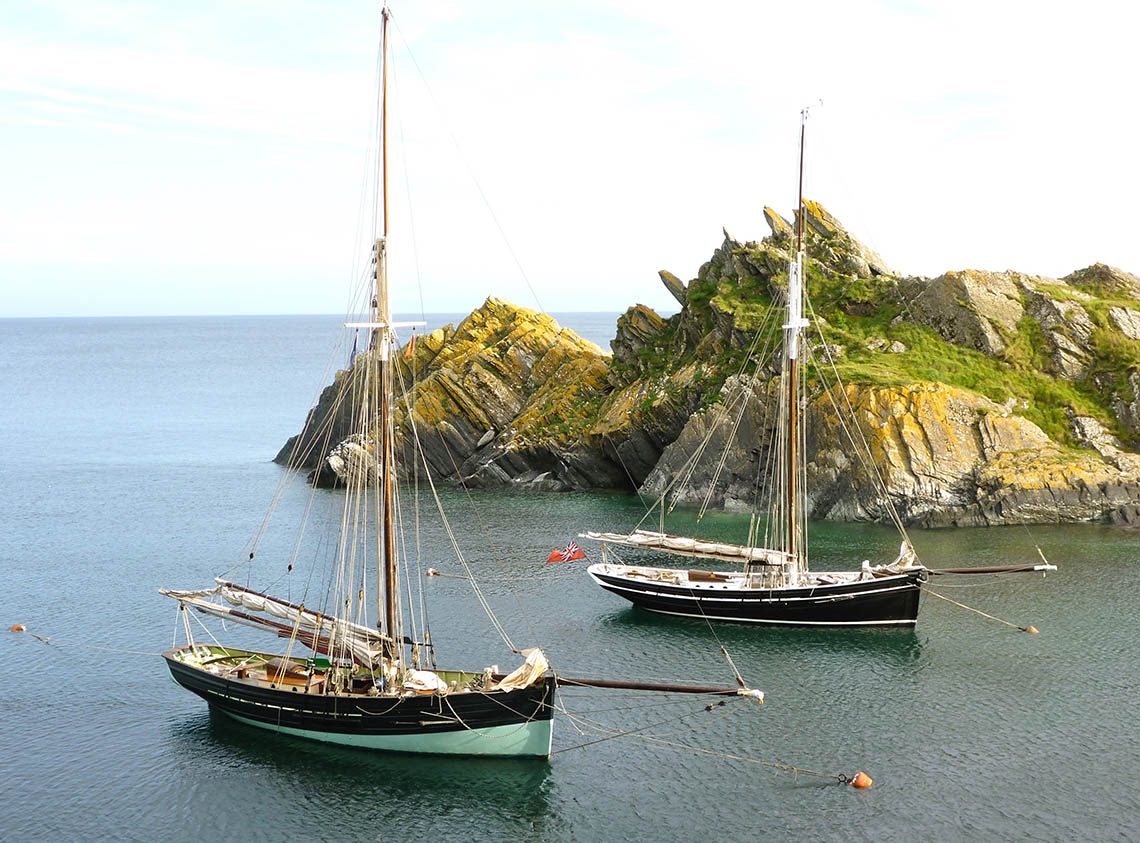
Photo: Luke Powell
Are you influenced or inspired by anyone in particular?
There are boatbuilders from the past whom I admire, especially chap called James Goss who worked at the top of the Tamar in the 19th century. I had a lovely photograph of him on the wall for many years. He’s surrounded by his workers, standing in front of his boat with his arms folded, looking very content. I thought, if I can find that contentment, that’s good enough.
What do you enjoy most about what you do?
Creating a beautiful object, primarily. It’s a subtle process, not too much, not to little – like making a cake, you have to get the ingredients just right. And when the boat launches, it’s wonderful – it’s as close as a man can get to having a baby!
How would you describe the experience of sailing on a traditional boat to someone who has never tried it?
People go sailing on modern boats, and everything works very well, but it’s completely without the depth of soul and feeling. I was walking down the high street in Falmouth the other day and I passed Stones Bakery, with all the beautiful bread in their windows. If you go a little further down the street to Tesco and look at the bread there, there’s no comparison. One is bread, the other isn’t – and that’s the same with boats. So much value can be drained out of an object, and yet it can still be called the same thing.
We live in a society now where we boil everything down to the cheapest elements and then call that adequate. It’s not. There’s more effort that goes into making a wooden boat, but it’s much more rewarding – what you put in is what you get out. And when you sail on a boat like this, it’s a time machine. It takes you back; it takes you to another place. A modern boat is like a car, it’s just a factory-made object that does no more than take you from A to B. A traditional wooden boat takes you through time and space.
When you’ve got some free time, where’s your favourite spot to anchor up in Cornwall?
If I tell you that, then you’ll all go there! My favourite place to sail to is the island of St Agnes in the Scillies. There’s a cove on the south side; sailing there in Agnes is special, because that’s where the original vessel was from, and there’s a great feeling of homecoming every time I go there. You go ashore, and the sand is all white, the sea is blue and you think you’re far from England, but it’s only 30 miles away. Then you go into the pub and there’s an old black and white photograph of the same boat, anchored in the same bay 150 years ago.
Luke wears: Sailor Shirt and Unisex Artist’s Shirt

